The Texas Gas Shortage
There is no gas shortage in Texas, according to basically everyone, but the lines at gas stations throughout Central and North Texas might lead you to believe otherwise. As concern about Harvey’s impact on the availability of fuel at the consumer-level rose, late in the week those anxieties played out as people across certain parts of the state—not Houston, so much, but certainly Austin, Dallas, and the surrounding areas—led to a massive run on supply at gas stations throughout the region. Twitter was full of photos of folks filling up their trucks, with 55-gallon drums in the bed, in anticipation of disaster.
This Twitter thread by Texas Tribune social media ace Bobby Blanchard sums up the issue succinctly:
Yes, the gas station next to your house may be out of gas.
No, that does not mean we have a fuel shortage in the state.
— Bobby Blanchard 🌈 (@bobbycblanchard) September 1, 2017
It’s not just the media and the state vouching for gas supplies, either. GasBuddy.com petroleum analyst Patrick DeHaan told the Dallas Morning News that terminals have adequate supply, but that gas stations are selling out so quickly because of the panic that they’re not going to be able to get refueling trucks to the station in time. That should, one hopes, level out as everyone’s 55-gallon drums get filled up. But for the time being, the advice here is that if you’re not low on gas right now, wait for the panic to blow over before filling up.
Rick Perry Opens Reserves
One of the reasons not to panic about fuel shortages is that the Department of Energy is drawing from the nation’s oil reserves to ensure that refineries in the Gulf—specifically, the Phillips 66 refinery in Lake Charles, Louisiana— remain operating. That’ll help mitigate some concerns, although Secretary Perry noted that the price of gasoline is likely to go up in the short term:
“Crude prices are going to go down because they can’t deliver and they can’t refine them. And gasoline prices are going to go up. We understand economically what’s going on here.”
There are 700 million barrels of oil in the Strategic Petroleum Reserve, and this move taps only a half million of them—which means that, should Perry and President Trump move forward with their proposal to draw back the nation’s reserves by 50 percent, a move like this is unlikely to sway the decision in either direction.
The Long-Term Future
So we know that, at the moment, there isn’t a gas shortage in Texas. We know that the DoE is drawing on our nation’s strategic reserves to ensure that refineries unaffected by the storm are able to keep producing in the immediate wake of the disaster. But what about the refineries off the Texas coast? The news there, mostly, is not great. The New York Times highlights the vulnerability of the energy industry to an event like Harvey:
“The hurricane did what terrorists could only dream of and take a third of U.S. refinery capacity off line for days on end,” said Michael E. Webber, deputy director of the Energy Institute at the University of Texas at Austin. “Over the long term, the energy sector will have to consider the costs of additional hardening of the infrastructure on the Gulf Coast versus moving to a different location like the Eastern Seaboard.”
The Texas and Louisiana coasts took on their vital role because they link vast oil and gas resources, both inland and offshore, with Caribbean and Atlantic shipping channels. But the damage from Harvey, which arrived with hurricane force, has exposed a downside: vulnerability to storms that experts say are becoming more extreme because of climate change.
Of course, the Eastern Seaboard isn’t immune to hurricanes—and hardening the infrastructure on the Gulf Coast would have benefits that extend beyond just ensuring that refinery capacity doesn’t suffer the way that it has in the immediate wake of Harvey. But the point—where do we go from here?—is still very much a valid one, whether the answer is “off the Atlantic Coast” or “back to Houston.”
The larger point, of course, is that there are a lot of question marks about the future as a result of Harvey. For now, there are no fuel shortages, even if prices at the pump are expected to rise. The release of oil reserves should help mitigate some of the immediate concerns regarding refinery production. But we still don’t know what to expect in the immediate wake of Harvey. We don’t know how long the refineries will be offline. We don’t know the environmental impact of the storm on the Gulf. We don’t know if this will help push the nation toward renewables—at least in the short term—or if relocating parts of the oil and gas industry outside of Texas is even a realistic proposition, given the state’s investment in the industry and the opposition it would likely face moving to a state that’s not in the Gulf. All of which is to say that this has been an unusual week in Texas energy, and we’ll be feeling the impact for some time to come.
- More About:
- Energy
- Hurricane Harvey








